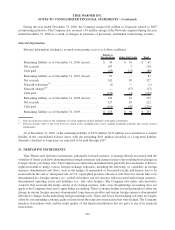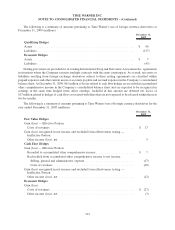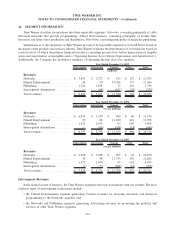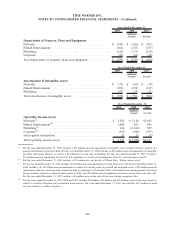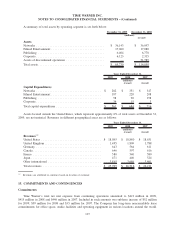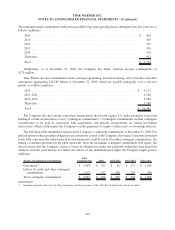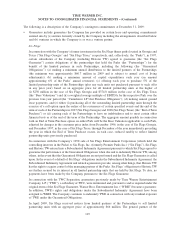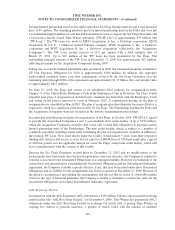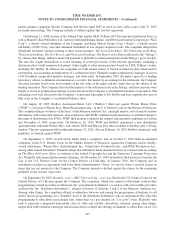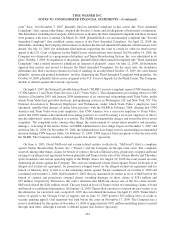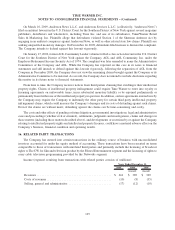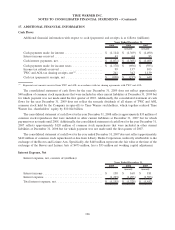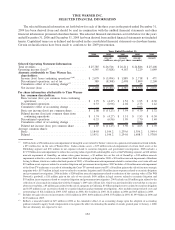Time Magazine 2009 Annual Report Download - page 134
Download and view the complete annual report
Please find page 134 of the 2009 Time Magazine annual report below. You can navigate through the pages in the report by either clicking on the pages listed below, or by using the keyword search tool below to find specific information within the annual report.Contingencies
Warner Bros. (South) Inc. (“WBS”), a wholly owned subsidiary of the Company, is litigating various tax cases
in Brazil. WBS currently is the theatrical distribution licensee for Warner Bros. Entertainment Nederlands (“Warner
Bros. Nederlands”) in Brazil and acts as a service provider to the Warner Bros. Nederlands home video licensee. All
of the ongoing tax litigation involves WBS’ distribution activities prior to January 2004, when WBS conducted both
theatrical and home video distribution. Much of the tax litigation stems from WBS’ position that in distributing
videos to rental retailers, it was conducting a distribution service, subject to a municipal service tax, and not the
“industrialization” or sale of videos, subject to Brazilian federal and state VAT-like taxes. Both the federal tax
authorities and the State of Sa
˜o Paulo, where WBS is based, have challenged this position. The matters relating to
state taxes were settled in September 2007 pursuant to a state government-sponsored amnesty program. In
November 2009, WBS elected to participate in a federal tax amnesty program, called “REFIS”, which offers
substantial reductions in interest and penalties for lump sum and installment payments of contested federal taxes.
For the federal taxes included in REFIS, the application of prior judicial deposits to certain of the debts, the return of
any excess judicial deposits, the return of a bank guarantee, and the dismissal of the underlying tax cases remain
pending. In addition to the federal tax matters being resolved through REFIS, WBS continues to litigate certain
other federal tax matters involving the imposition of taxes on royalties remitted outside of Brazil and the appropriate
tax rate to be applied. The Company intends to defend against these remaining tax cases vigorously.
On October 8, 2004, certain heirs of Jerome Siegel, one of the creators of the “Superman” character, filed suit
against the Company, DC Comics and Warner Bros. Entertainment Inc. in the U.S. District Court for the Central
District of California. Plaintiffs’ complaint seeks an accounting and demands up to one-half of the profits made on
Superman since the alleged April 16, 1999 termination by plaintiffs of Siegel’s grants of one-half of the rights to the
Superman character to DC Comics’ predecessor-in-interest. Plaintiffs have also asserted various Lanham Act and
unfair competition claims, alleging “wasting” of the Superman property by DC Comics and failure to accord credit
to Siegel, and the Company has filed counterclaims. On April 30, 2007, the Company filed motions for partial
summary judgment on various issues, including the unavailability of accounting for pre-termination and foreign
works. On March 26, 2008, the court entered an order of summary judgment finding, among other things, that
plaintiffs’ notices of termination were valid and that plaintiffs had thereby recaptured, as of April 16, 1999, their
rights to a one-half interest in the Superman story material, as first published, but that the accounting for profits
would not include profits attributable to foreign exploitation, republication of pre-termination works and trademark
exploitation. On October 6, 2008, the court dismissed plaintiffs’ Lanham Act and “wasting” claims with prejudice.
In orders issued on October 14, 2008, the court determined that the remaining claims in the case will be subject to
phased non-jury trials. The first phase trial concluded on May 21, 2009, and on July 8, 2009, the court issued a
decision in favor of the defendants on the issue of whether the terms of various license agreements between DC
Comics and Warner Bros. Entertainment Inc. were at fair market value or constituted “sweetheart deals.” The
second phase trial was previously scheduled to commence on December 1, 2009, and the parties are awaiting a new
date for the commencement of this trial. The Company intends to defend against this lawsuit vigorously.
On October 22, 2004, the same Siegel heirs filed a second lawsuit against the same defendants, as well as Warner
Communications Inc. and Warner Bros. Television Production Inc. in the U.S. District Court for the Central District of
California. Plaintiffs claim that Jerome Siegel was the sole creator of the character Superboy and, as such, DC Comics
has had no right to create new Superboy works since the alleged October 17, 2004 termination by plaintiffs of Siegel’s
grants of rights to the Superboy character to DC Comics’ predecessor-in-interest. This lawsuit seeks a declaration
regarding the validity of the alleged termination and an injunction against future use of the Superboy character. On
March 23, 2006, the court granted plaintiffs’ motion for partial summary judgment on termination, denied the
Company’s motion for summary judgment and held that further proceedings are necessary to determine whether the
Company’s Smallville television series may infringe on plaintiffs’ rights to the Superboy character. On July 27, 2007,
upon the Company’s motion for reconsideration, the court reversed the bulk of its March 23, 2006 ruling, and
requested additional briefing on certain issues. On March 31, 2008, the court, among other things, denied a motion for
122
TIME WARNER INC.
NOTES TO CONSOLIDATED FINANCIAL STATEMENTS – (Continued)


